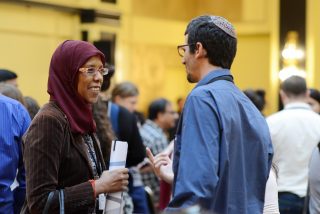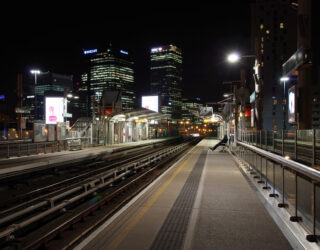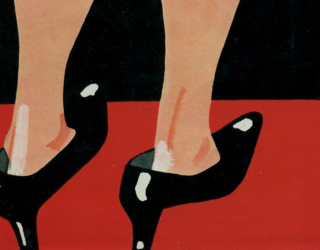Last month in Berlin, 150 early career up-and-comers from 33 different countries, on every side of the Muslim-Jewish relationship, including non-Jew non-Muslim ‘friends’ who are nonetheless intimately involved in the interaction, came together for the 7th Muslim Jewish Conference. I’ll admit up-front that I came in, as did many participants, with incredibly low expectations. “Interfaith Dialogue” brings up images of hippies singing Kumbaya and a whole lot of good vibes with no actionable take-away. After a week, I was positively surprised.
The MJC’s board is made up of notables like the Grand Mufti of Bosnia, the King of Morocco’s highest counselor, the former Chief Rabbi of Ireland, and some of Bill Clinton’s top peace-process figures, and it operates under the patronage of the German foreign ministry. It brings together Pakistani law students, Morroccan and Brazilian NGO founders, peace activists from the Middle East, members of the American Jewish Committees and Congresses, Argentinian and Bosnian journalists and lawyers from all over – a wide array of interesting people who want to work toward peace being given the opportunity to hash it out and bring their conclusions to their communities.
The convention was divided for about a third of the time into committees of around 15-20 people to take on a different aspect of the Muslim-Jewish interaction. In my committee on “Power, Religion, and Human Rights,” there were Israelis, Palestinians, Moroccans, Americans, all kinds of post-Yugoslavs, Pakistanis and Germans, each with differing relationships to their own faith and ethnic identity. Every member of the conference was passionate, and yet managed to create safe spaces to explore all aspects of faith-and-ethnic interactions and identity.
Gender, while not immediately evident as a primary sticking point, was in fact one of the main issues to arise in many committees
There was an incredible value in seeing people feel safe to discuss everything: Muslims from Morocco and Palestine had it out among themselves, with one Moroccan Arab Muslim woman calling herself both an Arab and a Zionist and being told by a Palestinian that she doesn’t get to call herself Arab if she calls herself Zionist. Meanwhile the exact opposite conversation was happening between Israelis and non-Zionist Jews, where one arch-Zionist told someone they weren’t a “real” Jew if they didn’t support Israel, and then had the opportunity to hear for the first time the words of a Theresienstadt concentration camp survivor about Zionists being the Nazis’ favorite Jews because “at least they thought in national terms”, all the while it was made safe to discuss these issues.

Gender, while not immediately evident as a primary sticking point in the Muslim-Jewish relationship, was in fact one of the main issues to arise in many committees, and again safe spaces were needed to have the necessary conversations. A Jewish male who considered himself very liberal reacted with shock and sadness to the view of a Latin American feminist that men cannot be feminists and that all men are potential rapists and that the patriarchy inherent in religious structures hurts women. This woman needed a safe space to say this without being shut down, and this man needed space to hear this and to say #NotAllMen and be critiqued.
Feminist reformist movements within Islam are starting to pay off in places like Denmark, in the same way those in Judaism a generation ago paid off in the USA
At the outset the conversations, even those about gender, were dominated by men – as does occur in modern monotheistic religious circles. But interestingly, certain men took notice of this gap and used their obvious communal power to ensure that they and other men stepped back and allowed female voices to be heard. The degree to which the conversation, not just the gender conversation but the entire Muslim Jewish conversation, benefited by this consciously sensitive handling of the space cannot be overstated.
Empowered and smart Muslim women from across the globe told their stories of why they choose to wear a headscarf, some as an act of defiance against the Islamophobic society in which they live, others as a symbol of identity just for themselves. After hours, discussions continued about how feminism and Judaism can go together, how modern Judaism has made enough room for women in recent generations that eventually they were able to become rabbis (it should be mentioned, given conversations with a female German rabbi at the convention, European Judaism is still not considered fully safe or equal for women), and how these fights parallel struggles within Muslim communities to get recognition for potential feminist reforms (which are starting to pay off in places like Denmark in the same way those in Judaism a generation ago paid off in the USA). We discussed theology, culture and social movements, and where feminist interpretation of scripture fits sometimes better than the traditional interpretation.

There is in fact no consistent view on Israel-Palestine among Muslims, and similarly among Jews, which was important for both sides to see
It goes without saying that Israel and Palestine came up a lot. The Parents’ Circle, an organization of families from both sides who have lost loved ones in the conflict, sent two representatives, one who’d lost his son, the other who’d lost his brother and infant nephew, to lead a discussion on Israel/Palestine, moderated by Joel Braunold, executive director of the Alliance for Middle East Peace.
In the hours that followed, those who came in as admittedly non-expert learned a great deal, while those who thought they knew a lot ended up disappointed and angry. Shocking, I know. It was striking how unimportant this section of the conference made the entire Israeli-Palestinian conflict in regards to the Muslim-Jewish relationship: The debate showed that there is in fact no consistent view on Israel-Palestine among Muslims, and similarly among Jews, which was important for both sides to see.
It was also important to see that even when Muslims and Jews disagreed on Israel and Palestine, they tended to have a huge amount of overlapping ethics and politics elsewhere. “The Situation,” as it was generally termed, became clearly a political issue that had virtually nothing to do with faith or ethnicity, and while no new plan was drawn up for resolving it, it became a less instrumental difference between us.
These young people are not big players in the major global interactions between Jews and Muslims, but they are all poised to be there in a decade
Positions may not have shifted significantly or outright, but we all learned new skills to understand each other better, and each group recognized to a far greater degree that neither Jews nor Muslims are some monolithic group that can be lumped into stereotypes but that ‘the Other’ is equally diverse to our own in-group. That was the stated point of the conference: not to persuade, but to discuss.
These young people are not the big players in the major global interactions between Jews and Muslims, but they are all poised to be there in a decade or two, and these sessions were vital starting points for those future conversations. Most of the Muslims had never met a Jew, and many Jews had never met a Muslim, yet nearly everyone I met at this conference had had some experience of being told by their political or religious leadership that the other was to be feared and protected against. As a Pakistani attendee of a previous MJC put it, “I came to the MJC because I do not like being told who to hate,” and those first meetings with ‘the Other’ would not have happened like this elsewhere.

The primary value of that interaction is the willingness of participants thereafter to say “I was wrong”. This is an incredibly hard thing to admit, that the beliefs one has held with a zealot’s absolutism were in fact based on false premises, that the actions one has committed were damaging. But the instant and sustained feeling of being able to admit it publicly is hugely self-affirming: I am a better person now than I was an hour ago, a month ago, a year ago, a decade ago, and I’ve only learned how to be the person I wanted to be all along by being wrong before. It’s a personal paradigm shift. There are also some huge “I was wrong” moments that are more than just self-affirming. Saying “I was wrong” can be institutionally powerful, even when it comes from an individual.
There were two big moments that stuck out where powerful future leaders actually changed their outlook as I looked on, due to the experience of meeting ‘the Other’. The first was in a private Intra-Faith Jewish session, where a well-connected, driven young American talked about their long-held view of Jews as superior to other races, their view of Palestinians and anti-Zionists as angry hateful anti-semites with tendencies toward violence and terrorism, and their view of Israel as infallibly right.
One person needed a forum in which it was acceptable to openly discuss their own racism
This person told some stories that painted them in an awful light, about how they’d opened their expensive condo in a major metropolis to a woman who had been the perfect house-guest (had left behind artisan honey and kept things clean and left a loving, personal note of gratitude) and how they were excited to become good friends with her forever. But then they saw this woman’s Facebook page and it was filled with criticisms of Israel and Zionism and now they felt sick that they’d ever let this horrible person stay in their house. But on the third day of the MJC, they’d met incredible young people who were as smart and driven and creative and interesting and loving as they are, and some of these incredible people were critical of Israel, and for the first time they were forced to reconcile the fact that someone can be a good person and still not like the Israeli government.
They told this story in this private space of their own in-group, and openly (if apologetically) admitted that they still believed in the superiority of Jews, but that they were being brought toward a respect for those with whom they disagreed. This person needed an open forum in which it was acceptable to discuss their own fears and racism, and their honesty and this interaction came about only because of the Muslim Jewish Conference. I watched them become more open and I believe that they in future can be hospitable and open to interaction when they previously would have been immediately hostile. That’s good for peace, and these shifts happened to many people on both sides.

During the conference, attendees visited the Sachsenhausen concentration camp, where some participants witnessed an unparalleled moment of protected dialogue allowing a breakthrough in worldview. Sachsenhausen started off unremarkable (as unremarkable as it can be to stand upon the ruins of the machinery of death where one’s own people were annihilated – but after visiting over a dozen camps in my decade in Europe, yes, I’d call Sachsenhausen’s official tour unremarkable): we did the tour, heard the basic facts about the victims and the perpetrators, saw the labor yards and the “Arbeit Macht Frei” on the gates.
There was a joint prayer at the central memorial of Sachsenhausen, in the place where the Jewish prisoners had stood as they were forced to watch their fellow prisoners hang
At a certain point I overheard a Pakistani Muslim woman in a headscarf talking a bit frantically to one of the convention’s Jewish staffers: In Pakistan, the Shoah is not taught in any significant way and this woman had heard that it was a far smaller number, if it had happened at all. But she saw the camp. She saw the devices of torture and heard the stories, she saw where they worked and imagined them working to death in those places, saw where they were gassed and imagined them suffocating on the spot where she stood, and she could only believe. So she asked what the data truly was, and where the numbers came from and how we could be certain. And she wept.
Of the 150 people wandering these grounds, the loudest sobs and the most tears came from those Muslims who’d never seen, never imagined this kind of horror and each of them, entering into the upper ranks of their society, will bring the knowledge of that pain and that horror back to their communities. At the end, there was a joint prayer, Jewish and Muslim, at the central memorial of Sachsenhausen, in the place where the gallows were. We stood where the Jewish prisoners had stood as they were forced to watch their fellow prisoners hang and would have been clubbed or shot if they looked away. The Imam and the Rabbi prayed and sang where that prisoner would have been hanged. It was beautiful and heart-rending, and the Jews, some of whom had family who had themselves perished in that exact camp and most of whom had family who had survived or perished in the Shoah, came up to comfort sobbing Muslim attendees.

At the Muslim Jewish Conference, Muslims and Jews alike gave themselves a moment in time to see where they might be wrong, and now they get to bring the realities back to their communities: that the Holocaust happened, that Jews are not some stereotype out of the Elders of Zion, that Muslims can be feminists and women can choose to wear the headscarf of their own volition, that people can oppose the state of Israel and still be decent human beings, that Muslims can weep with Jewish pain and vice-versa, that Muslim humor and Jewish humor have a whole lot of similarity, as do so many other parts of our cultures and beliefs. Over the course of one week, beliefs about the villainy of ‘the Other’ that have been implanted since birth shifted to a recognition of shared humanity. Peace in our time? Who knows, but maybe if the coming generation of leaders can talk to each other like this, can bring these messages back home, all hope is not lost?
There are those who would claim that because safe spaces are not naturally occurring in the public sphere they should not be promoted, that they weaken us intellectually. The world is not a safe space to be sure. But upon recognizing that, instead of casting off the concept it becomes our responsibility every time we hold a position of power, be it petty or true, to create safe spaces for those around us, as Heather McGhee did recently on C-SPAN, as certain male attendees of the MJC did for those women who were being talked over, and as the MJC does in general.
Extremism is bred by an inability to see alternative viewpoints, and safe spaces are a tool to fight extremism by allowing discussion to happen without viciousness or judgment, and allowing normally marginalized voices and thoughts to be given a fair hearing. Institutions who take a stand against safe spaces are breeding extremist thought. Instead of mocking or banning them, they should be encouraging the kind of intellectual behavior that makes them unnecessary, that makes everyone feel safe both to voice their views and to be wrong without judgment. The Muslim Jewish Conference is fighting extremism, with minimal Kumbaya-ing, and it has much to teach us.
Images: Daniel Shaked



